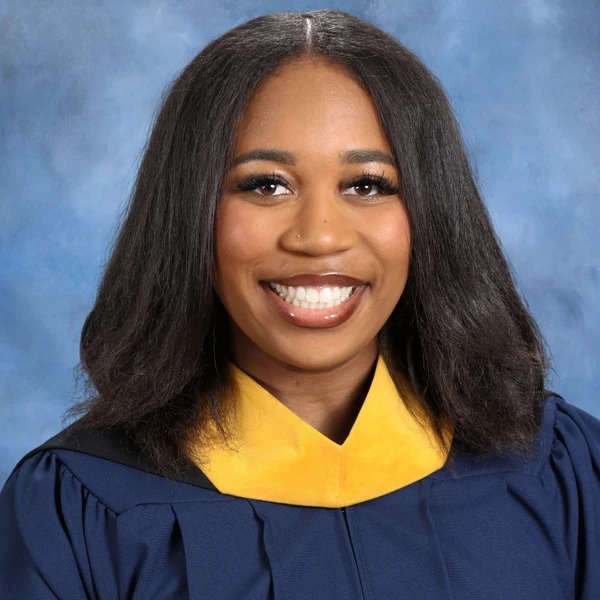
Hobbies and interests
Fitness
Weightlifting
Writing
Songwriting
Cheyenne Scott
645
Bold Points2x
Finalist1x
Winner
Cheyenne Scott
645
Bold Points2x
Finalist1x
WinnerBio
As a senior biology major with a chemistry minor at Howard University, I have cultivated a strong foundation in the sciences, consistently demonstrating academic excellence. My dedication to my studies has been recognized through my inclusion on the Dean's List during my freshman, sophomore, and junior years.
Beyond academics, I have been an active member of the Howard University community. I proudly played for the Howard University softball team during the 2021-2022 season and subsequently served as the team's manager from 2022 to 2024. These experiences have honed my leadership skills and taught me the value of teamwork and perseverance.
I am also a committed member of the Red Cross Howard Chapter, where I actively participate in initiatives aimed at making a positive impact on our community. My involvement in these extracurricular activities reflects my passion for service and my desire to contribute to the well-being of others.
My academic journey and extracurricular engagements have fueled my passion for medicine. I am eager to shadow professionals, volunteer, and conduct research to further immerse myself in the field. My ultimate goal is to pursue a career in pediatric surgery, where I can combine my love for science with my commitment to helping children lead healthier lives.
I am enthusiastic about the future and am actively seeking opportunities to expand my knowledge, gain hands-on experience, and make meaningful contributions to the medical field.
Education
Ohio State University-Main Campus
Master's degree programMajors:
- Cell/Cellular Biology and Anatomical Sciences
Howard University
Bachelor's degree programMajors:
- Biological and Biomedical Sciences, Other
Miscellaneous
Desired degree level:
Doctoral degree program (PhD, MD, JD, etc.)
Graduate schools of interest:
Transfer schools of interest:
Majors of interest:
- Cell/Cellular Biology and Anatomical Sciences
Career
Dream career field:
Medicine
Dream career goals:
Pediatric Surgery
Sports
Softball
Varsity2021 – 20232 years
Awards
- 2022 MEAC All-Academic Team
Softball
Varsity2021 – 20232 years
Research
Biological and Biomedical Sciences, Other
University of North Carolina at Chapel Hill — Intern2024 – 2024
Public services
Advocacy
Red Cross Howard Chapter — Blood Drive Coordinator2022 – Present
Minority Women in STEM
Winner`As soon as I walk into a room, I can feel the assumptions settle before I even speak. A young Black woman—often the only one in a lab coat or seated at the table—underestimated before I even open my mouth. But I’ve learned that the quiet power of resilience speaks louder than doubt ever could.
This truth followed me all the way to my research internship at the University of North Carolina at Chapel Hill. I had been selected for a competitive lung research program through the Human BioMolecular Atlas Program (HuBMAP). Yet, when I met my principal investigator for the first time, he assumed I was part of the janitorial staff. I stood there—credentials, experience, and ambition in hand—reduced to a stereotype before I could even introduce myself. That moment was painful, but not unfamiliar. It reminded me that my mere presence in these spaces is a disruption to the status quo—and that’s precisely why I must persist.
My story doesn’t begin in the lab, though. It begins in Charleston, South Carolina. Both of my parents were raised there, and my grandparents still live on the same land where their great-grandparents were once enslaved. The deep South carries the weight of a history anchored in racism, segregation, and exclusion. That legacy is not abstract to me—it’s personal. Yet here I am, with the same blood that toiled in bondage, now breaking into rooms my ancestors couldn’t have even imagined. Every lecture I attend, every lab I enter, every patient I shadow—I carry them with me. My success is not individual. It is ancestral.
Pursuing a career in medicine hasn’t been easy. As a first-generation college student and former Division I athlete, I’ve had to master the art of balancing a demanding course load with leadership roles, research commitments, and athletic responsibilities. After undergoing back surgery in 2021, I continued pushing forward in my academic journey, determined to study the very anatomy that once caused me so much pain. I now work as a manager for Howard University’s softball team, assist with neuroscience outreach, and volunteer to mentor underserved students—often while navigating the financial strain of tuition, textbooks, and graduate school preparation.
Even though I’ve made the Dean’s List every year, I still find myself constantly needing to prove that I belong. That I’m not a diversity quota. That I earned my seat at the table.
Receiving this scholarship would relieve a significant financial burden and allow me to focus more deeply on the things that matter—advancing in research, strengthening my medical school applications, and continuing to serve my community. It would free me from the constant anxiety of whether I can afford to keep chasing this dream and instead allow me to fully invest in becoming the physician I know I am meant to be.
This scholarship would not just support my education—it would support the transformation of a system that has long kept women like me on the outside looking in. And I’m determined to change that—from the inside out.